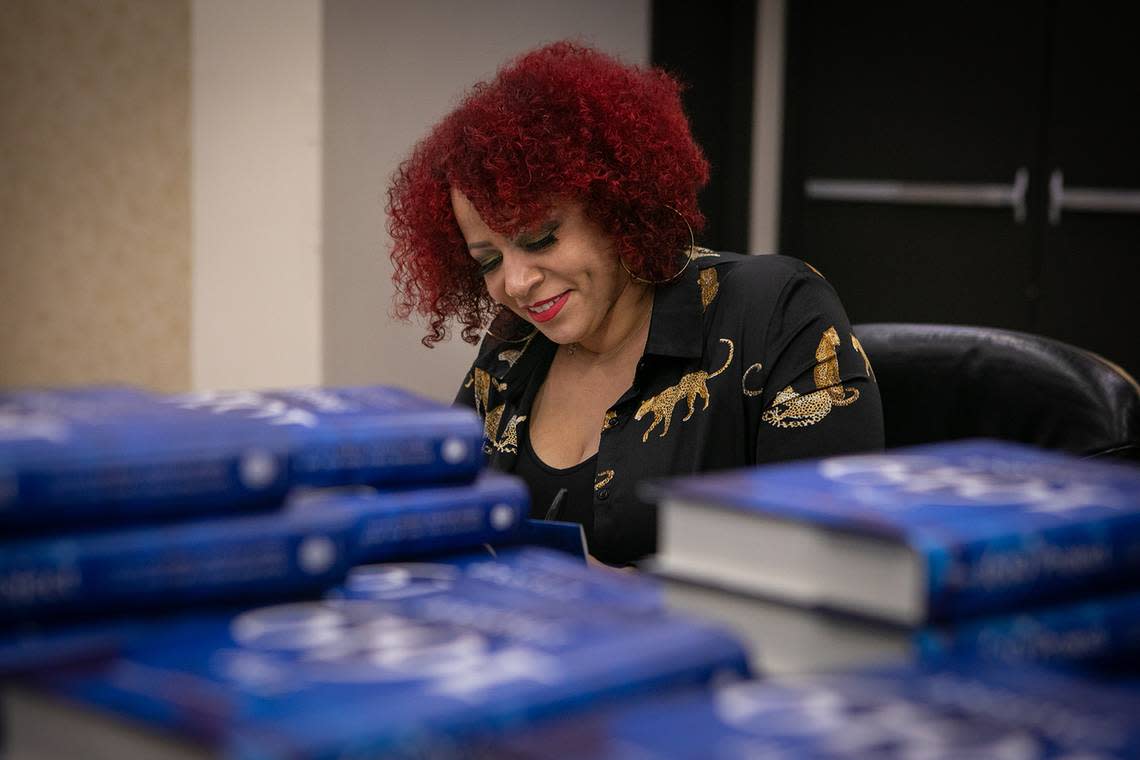Sacramento’s Juneteenth events feature The 1619 Project creator at Oak Park’s Guild Theater

- Oops!Something went wrong.Please try again later.
With Juneteenth this week Sacramento has parties, marches and more in celebration.
This Wednesday, the California Black Agricultural Working Group will host a celebration at the Capitol State Park as well as a resource fair. People are invited to “experience our unique California Journey from Slavery to Freedom here in the Great State of California,” according to the organization’s flyer.
On Tuesday, the Washington Neighborhood Center in downtown Sacramento is hosting a Juneteenth Poetry Night. The theme is international liberation and inspiration and attendees can listen to poetry, make their own zines and learn about the history of Black activism.
Juneteenth commemorates the date when Union soldiers arrived in Galveston, Texas, in 1865 to announce the end of the Civil War and an end to slavery, two years after President Abraham Lincoln signed the Emancipation Proclamation. President Joe Biden signed Juneteenth National Independence Day into law to commemorate the end of slavery in the United States on June 19 annually.
Oak Park celebrates with the 1619 Project creator
Pulitzer Prize-winning journalist and creator of The 1619 Project, Nikole Hannah-Jones joined Sacramento last Friday in another Juneteenth event.
An inter-generational audience of 200 attendees gathered at Oak Park’s Guild Theater, many with copies of The 1619 Project book, some well-worn, adorned with bookmarks and annotations, and others had never been opened before, having been bought minutes earlier at the entrance booth in preparation.
The Guild Theater was the second of Hannah-Jones’ stops for the day as she had been a guest speaker at Sacramento State for the CSU’s 2024 Juneteenth Symposium.
Sacramento natives Larry Lee, president of the city’s Black newspaper The Sacramento Observer and Maisha Winn, a former teacher and incoming faculty at Stanford University’s graduate school of education, moderated the event.
Hannah-Jones grew up in Waterloo, Iowa, a city not known for its Black population.
She was the first of her family not to be born on a cotton plantation and never even knew about Black people’s contributions to American history until she took a semester-long African-American experience class with her first black teacher.
“...Mr. Ray Dial, who exposed me to the year 1619, and the field of Black history and if it wasn’t for that, the 1619 project would not exist,” she said.
The idea of The 1619 Project, was planted in Hannah-Jones during this class where her preconceived notions of a Eurocentric view of the discovery of the Americas was challenged. Dial introduced her to books such as “They Came Before Columbus” and “Before the Mayflower.”
“Before the Mayflower” documents that Black Americans — at the time enslaved peoples from Africa — arrived in the United States in 1691, one year before the historical Mayflower carrying the first Pilgrims.
“Tracing my fingers across the words, I realized that the title evoked not a remote African history but an American one. African people had lived here, on the land that in 1776 would form the United States, since the White Lion dropped anchor in the year 1619,” she wrote in the preface of her book.
“They’d arrived one year before the iconic ship carrying the English people who got the credit for building it all,” she wrote.
It was at the start of 2019, when the 400-year anniversary of 1619 was coming up, that Hannah-Jones realized she now had the power and influence to change a whole population’s perspective on the history of the origins of Black people in America.
Teaming up with other writers, poets and historians, Hannah-Jones embarked on a months-long project to reframe American history with 1619 as the starting point, not 1620.
In August, the anniversary month of 1619, the first publication was released. In the preface, Hannah-Jones wrote about how it felt to hear about how people waited in lines for hours to snag a copy of the publication. With all the positive and grateful reception, there was also major backlash from historians and conservative media.
As the author talk continued, she recalled how many historians had an issue with the stance she took on slavery, framing it as the main reason why the colonists declared independence from Britain.
“They did not agree with our framing, which treated slavery and anti-Blackness as foundational to America,” she had written. “They did not like our assertion that Black Americans have served as this nation’s most ardent freedom fighters and have waged their battles mostly alone, or the idea that so much of modern American life has been shaped not by the majestic ideals of our founding but by its grave hypocrisy.”
While Hannah-Jones still works at The New York Times, she is also the inaugural Knight Chair in Race and Journalism at the Howard University School of Communications and founder of the Center for Journalism and Democracy.
During the event, Hannah-Jones also promoted her new children’s book she co-wrote called The 1619 Project: Born on the Water. The book is a rewriting of the original The 1619 Project but for a younger audience.
Hannah-Jones said the inspiration for it stemmed from a conversation she had with her young daughter where her daughter was confused as to which flag to draw to represent her lineage.
“And so I really wanted to give us a story to say our flag is the American flag,” said Hannah-Jones.
“They’ve tried to deny us our lineage, and our birthright, deny us the ability to claim the country that our ancestors built, and so I wanted to give Black American children their own origin story.”
However, in spite of the challenges, backlash and criticism Hannah-Jones was faced with in publishing her writing, she still chooses to see the good things in the world.
“All Black life cannot be suffering,” she said.
“Never has been. Never will be. We will have joy, we will find joy and we will fight at the same time,” she said.

